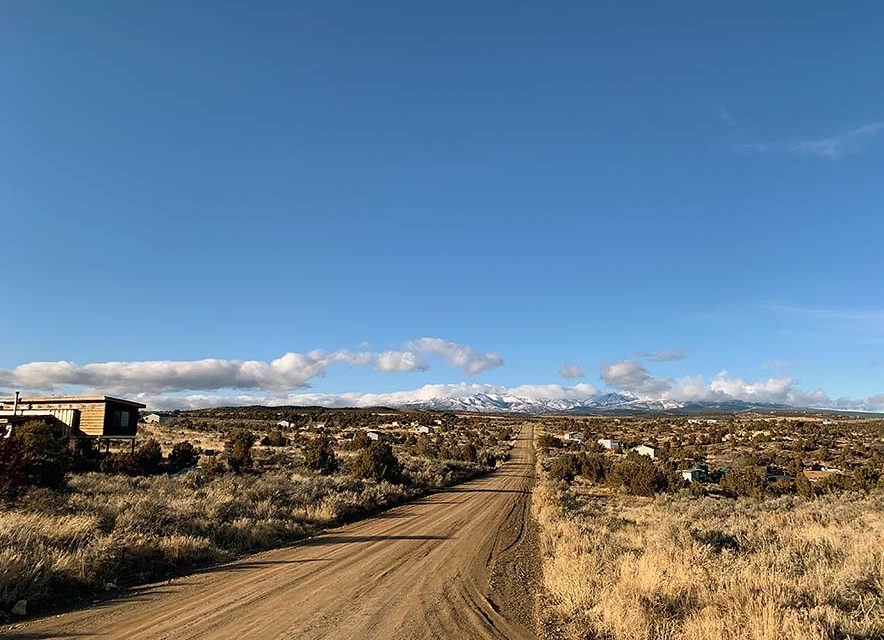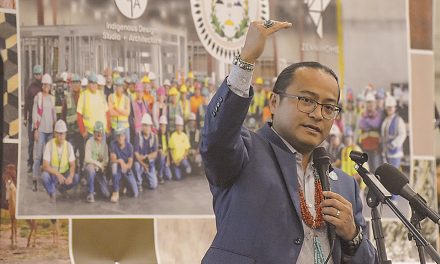
Diné village in Utah battles for electric, water services

Courtesy photo | Utah Diné Bikeyah
The Westwater community on the edge of Blanding, Utah, has been without electricity or running water since its inception. There's now a collaborative move to run utilities to the Navajo village.
WINDOW ROCK
Pamela King said the distance between Westwater and Blanding, Utah, is so close you could throw a Frisbee across it.
But what won’t reach the Navajo subdivision from the white Mormon city is electricity and water.
King, who has land in Westwater, where her grandfather and great-uncles were raised, has been speaking up, along with others, trying to get assistance and funding to bring water and electricity to the 29 families that live there.
“You can see the community of Westwater and the first thing that is noticeable is there isn’t power lines, no streetlights,” said King. “I know for the most part, the rest of the Navajo Nation is in the same state of having no electricity or water … but what makes Westwater unique is it’s not far from Blanding. Children can see lawns being watered with sprinklers, they see the streetlights, the paved roads.”
Last week, King, her mother Evangeline Gray, and other Westwater residents advocated at the Utah Legislature for Rep. Phil Lyman’s appropriations request of $500,000 to help the community. This could be decided at any time.
King said the lobbying effort was made possible with the help of Utah State Treasurer David C. Damschen, who she said took the afternoon off to escort them around the Legislature to speak with lawmakers on the need for this appropriation.
“It takes powerful people to make things like this work, it just doesn’t happen on its own,” said King. “Awareness is not just happening now, it’s been long coming. There has been people who have worked on this way back when, then put it aside … it’s been ongoing.”
Damschen, who is also the chair of the Utah Navajo Trust Fund trustees, said he has worked with Utah Gov. Gary Herbert, Lyman, Utah Navajo Trust Fund staff, and others to advance a $500,000 appropriation request from the Legislature towards a project that will extend electricity into the Westwater community.
He explained that the $500,000 is not enough to supply the needs of Westwater. The initial priority, or Phase 1, is electricity, which is estimated to cost approximately $1.5 million.
“We are hopeful that, should the state come to the table with the $500,000 appropriation, other sources including the Utah Navajo Trust Fund, can be combined and that we can ultimately access funding sufficient to complete Phase 1,” said Damschen in an email to the Times.
Once access to electricity is established, water infrastructure development, or Phase 2, can be pursued with the likely assistance of federal funds and other sources. Phase 2’s cost is currently estimated at approximately $1.9 million, he said.
Damschen said he, along with Utah Navajo Trust Fund staff, representatives from the Utah governor’s office, the Church of Jesus Christ of Latter-day Saints, Rocky Mountain Power, and Navajo Tribal Utility Authority met with President Jonathan Nez and Vice President Myron Lizer to discuss ways to collaborate on the issues affecting Westwater residents.
“It’s going to be a partnership between our office and all those parties,” said Nez. “This is a great partnership in order to establish utilities, water and electricity to the people of Westwater community.
“Due to the conflict that has been happening in San Juan County, this is a great way for everyone to heal and help one another and work together,” he said, referring to the recent gerrymandering lawsuit that saw the county redistricted and two Diné commissioners elected.
Damschen said numerous organizations have helped Westwater community build houses and install solar panels, water cisterns, septic tanks, and leach fields. Despite more than 30 years of concerted effort, plans to develop essential infrastructure and services have failed due to lack of funding.
But some see the political tension (such as the Bears Ears National Monument designation, San Juan County commission upheaval, and the recent failed proposition to investigate reorganizing the commission) as well as racism, as the reason for Westwater being in the situation it’s in.
King said she has read comments about the Westwater issue and one comment struck her because of its ignorance and racist undertones: “Just give them their government checks and they should pay for it themselves.”
“What government checks?” asked King. “Everyone I know has a job. Everyone there is hardworking people, if not retirees. People who work there, even if they’re retired and elderly, they were the ones who helped build Blanding.”
Davis Filfred, former Navajo Nation Council Delegate for Tolikan, Red Mesa, Mexican Water, Aneth and Teec Nos Pos, who now is a staff assistant in Nez’s office, has been working on the Westwater issue for years and continues to.
“There was no money,” said Filfred on why it’s taken so long to get it to this point.
He also noted that Blanding residents have said that Westwater residents don’t pay city property taxes, so it doesn’t deserve basic amenities provided by Blanding.
Purchased by the Navajo Nation in 1986, Westwater is on 120 acres of “fee simple” land owned by the Navajo Nation. Fee simple land is essentially private land with property taxes going to San Juan County to provide services.
The land status creates jurisdictional issues as to which government is required to provide services to the community, according to Utah Diné Bikeyah.
Filfred said establishing an electric line from Blanding to Westwater would take at least four or five poles, but since obstacles are in the way, NTUA is looking into establishing the line through another route for less cost.
“We’ve been meeting periodically with Westwater residents for years regarding utility extensions,” said Deenise Becenti, government and public affairs officer for NTUA. “In recent years, we’ve placed solar residential units to some homes as one alternative. We are happy to hear the state of Utah is focusing on extending electricity to Westwater Village.”
To donate to the effort, go to Utah Diné Bikéyah’s website and type “Water to Westwater” in the donation field called “Notes.” One hundred percent of funds collected will support the Westwater community and the effort to connect it to utility services.
Information: utahdinebikeyah.org/contribute/








 Highway 264,
Highway 264, I-40, WB @ Winslow
I-40, WB @ Winslow